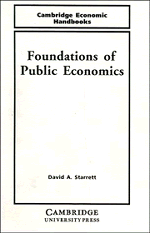Book contents
- Frontmatter
- Contents
- Preface and acknowledgments
- Notation
- PART I Scope and limitations
- 1 Introduction
- 2 Social objectives and direct decision making
- 3 Market decentralization
- 4 Theory of collective goods
- PART II Decision making in a mixed economy
- PART III First-order project analysis
- PART IV Evaluating large projects
- Epilog
- References
- Author index
- Subject index
- Frontmatter
- Contents
- Preface and acknowledgments
- Notation
- PART I Scope and limitations
- 1 Introduction
- 2 Social objectives and direct decision making
- 3 Market decentralization
- 4 Theory of collective goods
- PART II Decision making in a mixed economy
- PART III First-order project analysis
- PART IV Evaluating large projects
- Epilog
- References
- Author index
- Subject index
Summary
We present here a synthesis of recent developments in normative welfare economics that have direct application in public finance. Within this rather broad subject, we will emphasize operational prescriptions for public policy in a “mixed” economy consisting of a public sector, a private-market sector, and some limited links and controls between them.
Since the book is mostly about normative economics, we start with a discussion of social objectives. Our approach is that of the “old welfare economics,” and since the term “old” may connote “outdated” to some, we argue the point at some length. In the process, we air our views on the methodology of interpersonal comparisons and distributional equity. Having settled on a normative methodology, we use it to justify our conception of the mixed economy. Chapters 2 and 3 begin this development squarely in the tradition of competitive theory. We outline reasons why “direct” decision making is inadequate and summarize the case for market decentralization.
Staying in this tradition, we define collective goods by intrinsic characteristics that make them unmarketable. We develop a conceptual framework for studying such goods that is general enough to encompass many common examples such as natural monopolies, pure public goods [as defined by Samuelson (1954)], and “club” goods [as defined by Buchanan (1965)]. Although all these examples share an important common element, distinctions among them provide foundations for a normative theory of “fiscal federalism”; pure public goods are best allocated by a national entity, whereas club goods are best allocated by a more local entity.
- Type
- Chapter
- Information
- Foundations in Public Economics , pp. 3 - 7Publisher: Cambridge University PressPrint publication year: 1988



